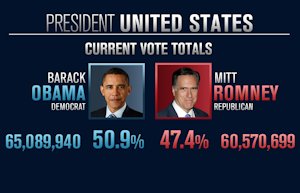Health Care Pretzel Logic
 | | Finally, a context for this image! |
It's safe to say that the modern Democratic Party is opposed, in general, to the government helping wealthy corporations. The opening segment of the 2012 Democratic Party Platform argues that the problem with the Republican form of governance is that Republicans "still believe the best way to grow the economy is from the top down--the same approach that benefited the wealthy few but crashed the economy and crushed the middle class." The platform goes on to argue that this is "the defining issue of our time and at the core of the American Dream." A few paragraphs later, Republicans are criticized for believing that "if we help corporations and wealthy investors maximize their profits...it will automatically translate into jobs and prosperity that benefits us all," which would unfairly give "trillions of dollars in tax cuts weighted towards millionaires and billionaires." At the end of this declaration of principles, the Democratic Party platform announces that instead of being the party that benefits the wealthy at the expense of everybody else, the Democrats are "the party of inclusion and respect differences of perspective and belief."
That language was agreed upon at the Democratic National Convention just one year ago, and most Democrats would still agree with it. In essence, one of the pillars of the modern Democratic argument is that the government should not give tax money to wealthy corporations because that will crash the economy and crush the middle class. Instead, the people should trust the Democratic Party as being "the party of inclusion" that will stand up for the little guy, for minorities, the middle class, and people of different beliefs. It's not a stretch to say that this is what most Democrats believe.
 | | It's so thoughtful of the government to give tax credits to people so that they can give more money to those poor, disadvantaged health insurance companies |
And yet, in the raging debate over the Affordable Care Act (often refered to as "Obamacare" by both parties), what is often lost in all the shrill talking points is that the Democrats have twisted their rhetoric so far as to turn one-hundred-eighty degrees against this basic party principle. The Affordable Care Act, if executed as planned, far from taking money from wealthy corporations and giving it to the middle class, is actually a boon for health insurance companies. It "mandates" that all Americans need to purchase health care from an insurance company, and if the insurance is too expensive, the government will subsidize the difference, potentially siphoning hundreds of millions of dollars directly from Washington to the pockets of health insurance fatcats and their investors. This is the only way the law can appear to reduce the cost of health care, because no matter what anybody tells you, there is no such thing as a free lunch.
One of the side effects of the new law going into effect is that millions of Americans who were signed up through the individual insurance market with plans that Washington now deems "substandard" are receiving cancelation notices. The president has apologized for this happening to people who took his campaign promises too literally, while assuring these people that they can now get "better" plans through the exchanges being set up as a result of the ACA. Even in the absence of predictable government incompetence in setting up these exchanges, those with canceled plans are discovering that the "better" plans they are now mandated to choose from are often more expensive and cover new things that Washington now considers necessary.
 | | Five percent is no big deal, right? |
Confused by the uproar in the media over people not being grateful for these "better" options, White House Press Secretary Jay Carney reminded reporters that "we're talking about five percent of the country." During a rare presidential press conference last Thursday, President Obama made the same point, that "the individual market accounts for five percent of the population." The implication is that, since only five percent of the American population is being affected, it's no big deal. So much for the party of inclusion.
To his credit, the president did offer up a "fix" for those five percent, telling insurance companies that he would postpone enforcing ACA standards for individual insurance plans for one year. Forget the clear illegality of changing the law during a press conference and the implausibility of expecting insurance companies to reverse in six weeks what they spent three years preparing. This "fix" does nothing to stop this from happening again in a year, nor does it address what will happen when the employer-based insurance market is forced to abide by the same federal standards. Assuming nothing changes, we're going to start seeing plenty more cancelation notices in 2013, and they will affect well more than five percent of the population.
 | | A health insurance company CEO after the implementation of the ACA |
Going at least back to the health care summit of 2010, Republicans have been proposing that a better solution to improving health insurance in America would be to allow people to buy insurance policies from other states. The theory here is that insurance companies would have to compete more than they do now, and more competition would lead to a better product at a lower cost. Far from being a benefit to wealthy insurance companies, it would probably put several of them out of business and allow for more innovative companies to rise from the ashes. Predictably, the wealthy insurance companies are not a fan of the Republican plan--since it would force them to work for their money--but they enthusiastically supported the implementation of the ACA, since it demands that everyone buy their more expensive plans and that a bunch of extra government tax revenue will come their way even when customers can't pay.
Now, the Democratic talking heads have concluded that people are only really upset with the party because of a malfunctioning website. That's nonsense. Sure, the spectacular failure of healthcare.gov brought this subject to the forefront, but even if the online exchanges worked perfectly on October 1st, those cancelation letters would still have gone out and the ACA would still have been exposed as being a piece of legislation that goes against the basic principles of the modern Democratic Party. It surprises me, frankly, that more Democrats aren't upset, that the law still has a relatively high approval rate from the left (58% according to the latest CBS News Poll, compared to an overall 31%). Perhaps nobody bothered to tell them that ignoring a "five percent" minority and giving so much tax money to "millionaires and billionaires" will crash the economy and crush the middle class.
-e. magill 11/20/2013
|
|